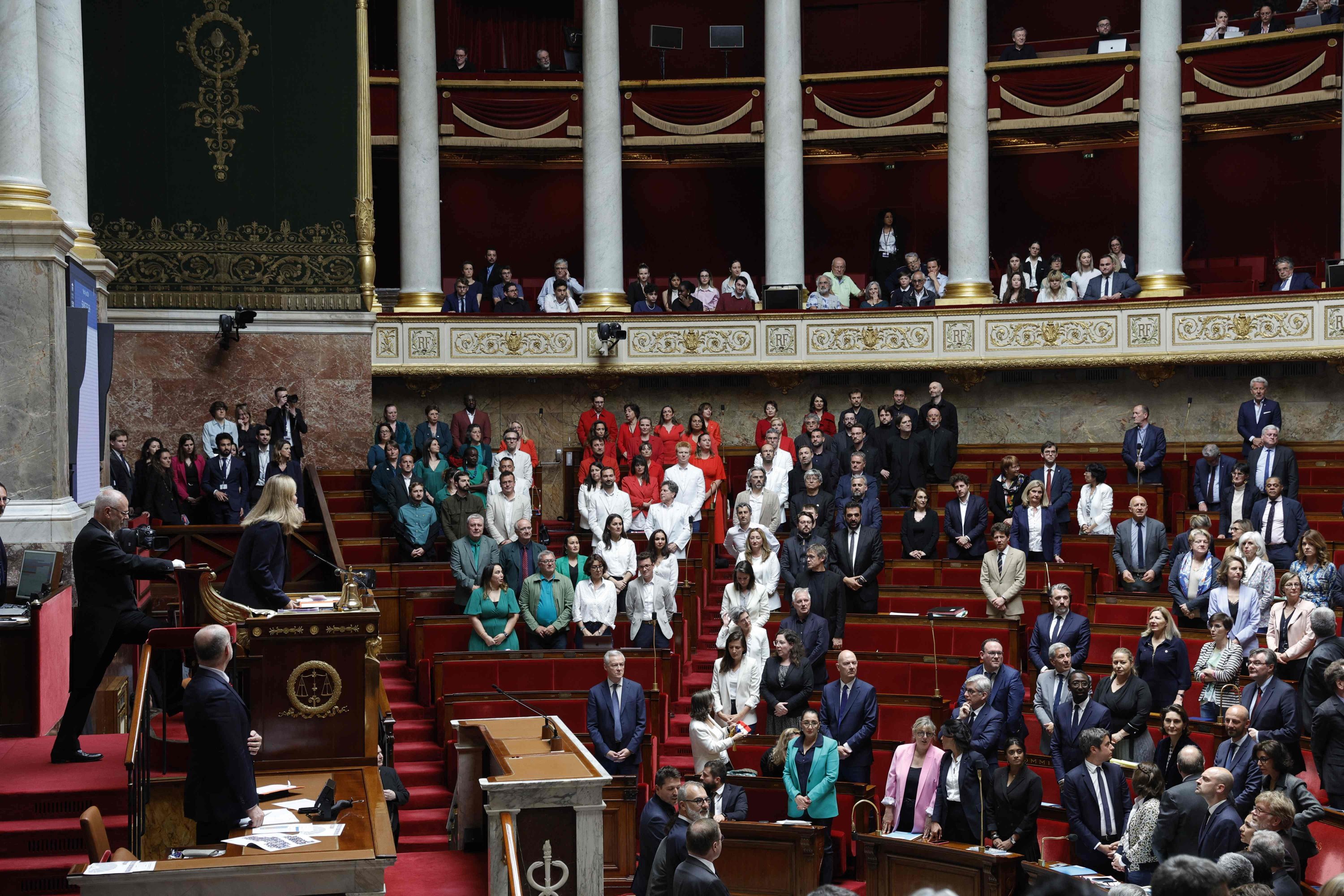Rehabilitating Dreyfus: French Lawmakers' 130-Year-Late Plea

Table of Contents
The Dreyfus Affair: A Recap of Injustice
The Dreyfus Affair, a watershed moment in French history, remains a potent symbol of antisemitism and judicial error. Understanding the context is crucial to grasping the significance of the current efforts to rehabilitate Dreyfus.
The False Accusation and Subsequent Trial
Alfred Dreyfus, a Jewish Captain in the French Army, was falsely accused of treason in 1894. The evidence presented against him was largely fabricated or misinterpreted, fueled by rampant antisemitism within the military establishment.
- Key figures: Major Ferdinand Walsin Esterhazy (the actual culprit), Lieutenant Colonel Georges Picquart (who later uncovered the truth).
- Fabricated evidence: A bordereau (memorandum) allegedly written by Dreyfus, containing military secrets, was presented as irrefutable proof, despite its questionable authenticity.
- Anti-Semitic climate: The pervasive anti-Jewish sentiment in late 19th-century France significantly contributed to Dreyfus's unjust conviction, with many believing the accusations without question.
The Impact of the Affair on French Society
The Dreyfus Affair deeply divided French society, exposing the ugly underbelly of antisemitism and the fragility of the French justice system.
- Rise of antisemitism: The affair fueled existing anti-Jewish prejudices and led to a surge in antisemitic rhetoric and actions.
- Role of the army and government: The French Army and government initially covered up the truth, prioritizing institutional prestige over justice.
- Public reaction: The affair polarized public opinion, with passionate debates erupting between Dreyfusards (supporters of Dreyfus) and anti-Dreyfusards (those who believed in his guilt).
The 130-Year Delay: Reasons for the Belated Plea
The recent call for rehabilitating Dreyfus, arriving over a century after the event, raises questions about the timing. Why now?
Political Considerations
The timing of this renewed focus on rehabilitating Dreyfus is unlikely to be entirely coincidental.
- Current political climate: France, like many Western nations, is grappling with a resurgence of antisemitism and far-right extremism, making a renewed commitment to justice particularly pertinent.
- Potential electoral considerations: Some suggest that the timing may be politically motivated, aiming to appeal to certain segments of the electorate.
- Symbolic reconciliation: The act of rehabilitation can serve as a powerful symbol of national reconciliation and a rejection of past injustices.
Societal Shifts and Evolving Understanding of Justice
Several factors have contributed to the shift in societal attitudes toward the Dreyfus Affair.
- Increased awareness of historical injustices: A heightened awareness of historical injustices and a renewed focus on social justice have pushed France to confront its past.
- Influence of contemporary social justice movements: Contemporary social justice movements, particularly those focused on combating antisemitism and racism, have played a significant role in prompting this renewed attention.
The Implications of Rehabilitating Dreyfus: A Symbolic Act of Reconciliation
The symbolic weight of rehabilitating Dreyfus is immense, carrying implications far beyond a simple legal correction.
National Reconciliation and Healing Past Wounds
Rehabilitating Dreyfus offers a powerful opportunity for national reconciliation and healing.
- Symbolic significance: The act holds significant symbolic value, demonstrating a commitment to acknowledging past wrongs and promoting a more just society.
- Impact on French national identity: It allows France to confront a dark chapter in its history and redefine its national identity as one that prioritizes justice and equality.
- Lessons learned: It provides an opportunity to reflect on the dangers of unchecked power, antisemitism, and the importance of independent judiciary.
The Fight Against Antisemitism
The rehabilitation effort can significantly bolster the fight against antisemitism in contemporary France.
- Statement against intolerance: It sends a strong message against intolerance and discrimination.
- Commitment to justice and equality: It demonstrates a commitment to justice and equality for all citizens, regardless of their religious or ethnic background.
- Renewed educational initiatives: The renewed focus on the Dreyfus Affair can lead to more robust educational initiatives aimed at combating antisemitism and promoting historical understanding.
Challenges and Criticisms: Potential Obstacles to Full Rehabilitation
Despite the widespread support for rehabilitating Dreyfus, there are potential obstacles.
Resistance from within the Military and Political Establishment
Some conservative elements within French society may resist the rehabilitation effort.
- Historical revisionism: Attempts to downplay the significance of the affair or deny the injustice inflicted on Dreyfus might persist.
- Entrenched power structures: Resistance from within the military or political establishment, still clinging to traditional hierarchies, might emerge.
- Potential for backlash: The rehabilitation effort could trigger a backlash from those who view it as an attack on national pride or military honor.
The Limits of Symbolic Gestures
While symbolic gestures are crucial, they are not sufficient to address deeply rooted issues.
- Need for tangible action: Rehabilitation must be accompanied by tangible action to combat ongoing antisemitism and systemic inequalities.
- Combating ongoing antisemitism: The fight against antisemitism requires more than symbolic gestures; it demands sustained effort, legislation, and education.
- Addressing systemic inequality: Rehabilitating Dreyfus should be viewed as part of a broader effort to address systemic inequalities and injustices within French society.
Conclusion: The Enduring Significance of Rehabilitating Dreyfus
The late plea to rehabilitate Dreyfus highlights the enduring legacy of this historical injustice and the ongoing struggle for justice in France. The reasons behind the delay are multifaceted, reflecting both political considerations and evolving societal attitudes toward justice and antisemitism. While the rehabilitation holds significant symbolic value, promoting national reconciliation and combating antisemitism, it also faces potential challenges from resistance within established power structures and the inherent limitations of symbolic acts. Understanding the complexities of the Dreyfus Affair and actively supporting efforts to rehabilitate its legacy remains crucial for a more just and equitable France. The ongoing efforts to rehabilitate the legacy of Dreyfus are not just about a single historical figure; they represent a continuous commitment to fighting injustice and building a more tolerant society.

Featured Posts
-
 Konchita Vurst Pro Yevrobachennya 2025 Chotiri Potentsiyni Peremozhtsi
May 25, 2025
Konchita Vurst Pro Yevrobachennya 2025 Chotiri Potentsiyni Peremozhtsi
May 25, 2025 -
 Draper Claims First Atp Masters 1000 Title At Indian Wells
May 25, 2025
Draper Claims First Atp Masters 1000 Title At Indian Wells
May 25, 2025 -
 Understanding Flash Flood Emergencies A Comprehensive Guide
May 25, 2025
Understanding Flash Flood Emergencies A Comprehensive Guide
May 25, 2025 -
 Dr Terrors House Of Horrors Your Complete Guide To The Experience
May 25, 2025
Dr Terrors House Of Horrors Your Complete Guide To The Experience
May 25, 2025 -
 Rtx 5060s Disappointing Launch Implications For The Future Of Graphics Cards
May 25, 2025
Rtx 5060s Disappointing Launch Implications For The Future Of Graphics Cards
May 25, 2025
